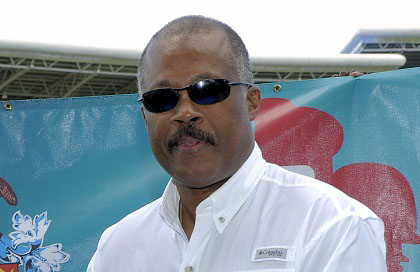KINGSTON, Jamaica, CMC – Leading Caribbean academic, Professor Sir Hilary Beckles has strongly endorsed CARICOM’s intervention in the running of West Indies cricket, warning the governance of the game in the region had reached a “perilous state.”
The UWI Vice-Chancellor and former Cave Hill Campus principal, Sir Hilary contended the region’s political leaders were “duty bound” in their current efforts at restructuring since “the current system of governance and accountability is not fit for purpose.”
He referenced regional governments as “honest brokers of last resort” while asserting their right to “to rise to the responsibility of contributing to the restoration of public decency and sustainability in the affairs of our proud cricket nation.”
“It is impatient of debate that heads of governments have a duty to facilitate an enabling environment within which our greatest cultural achievement as a people – the honour and privilege of leading the world in the excellence of Test cricket,” Sir Hilary said in a written statement.
“They are duty bound by the imperative of political best practice to intervene in the affairs of this heritage with a view to protecting and promoting it for the benefit of future generations.
“It is obvious to all, at home and abroad, that the governance of West Indian cricket has reached a perilous state, and that the place where there was once universal respect is now riddled with ridicule.
“After two decades of performance decline, efforts to chart a path of resilience and recovery have failed. The evidence of obvious failure emanates from the system of governance and accountability that has let down the community of cricketers and the wider society.”
He added: “It would be a dereliction of duty if governments were to sit passively and allow the public good, that is cricket culture, to be further diminished and destroyed. West Indians have made their greatest single cultural investment in cricket, and governments are duty-bound to protect this investment and assure appropriate returns.”
A former director of Cricket West Indies (formerly West Indies Cricket Board), Sir Hilary’s intervention in the raging debate comes as CARICOM said recently it was pressing ahead with laying the groundwork for the restructuring of the game’s governance.
Speaking to the matter earlier this month, chairman of CARICOM’s sub-committee on cricket, St Vincent and the Grenadines Prime Minister Ralph Gonsalves, said the framework was being prepared to guide the push towards ensuring a “legislative approach.”
CWI has continued to resist CARICOM’s efforts at reform but Sir Hilary said the need was even more glaring now since West Indies cricket in every aspect had “deteriorated in the eyes of the public and its stakeholders.”
Despite the more recent CARICOM-commissioned Governance Report authored by UWI Cave Hill principal, Professor Eudine Barriteau, Sir Hilary said the 2007 Patterson Report remained the model for reform.
“The current system of governance and accountability is not fit for purpose. It is dysfunctional at the management and operational levels and is in urgent need of reform,” Sir Hilary argued.
“Without an appropriate and urgent intervention, the culture of cricket will continue to wither on the vine and die as an element of excellence in Caribbean civilization.
“The Patterson Report remains the place of necessary intervention. Cricket officials have consistently alluded to the general acceptance of its recommendation. This is in part correct.
“But where officials have rejected the core of the report, is with respect to the accountability of the President and the board to stakeholders.”
He added: “The subsequent rejection of this vital recommendation, despite earlier agreement, has resulted in the worsening of the affairs of West Indian cricket. In every aspect, it has deteriorated in the eyes of the public and its stakeholders.”
Controversial CWI president Dave Cameron has contended that the body’s leadership must be “selected free of interference from governments” but Sir Hilary said there was precedent for CARICOM’s actions.
“Direct interventions by governments in their roles as honest brokers of last resort are consistent with approved principles of popular democracy. The situation today is one of last resort: it is now or never,” he stressed.










